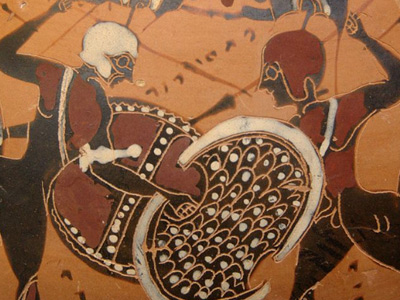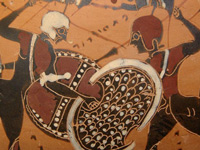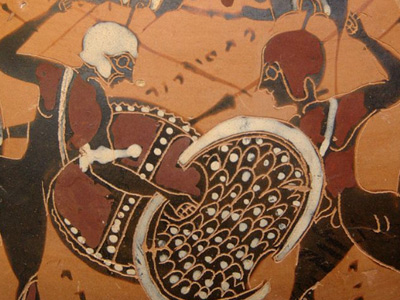First Peloponnesian War (460-445 BC)

The First Peloponnesian War (460–445 BC) was fought between Sparta as the leaders of the Peloponnesian League and Sparta's other allies, most notably Thebes, and the Delian League led by Athens with support from Argos. This war consisted of a series of conflicts and minor wars, such as the Second Sacred War. There were several causes for the war including the building of the Athenian long walls, Megara's defection and the envy and concern felt by Sparta at the growth of the Athenian Empire.
The war began in 460 BC (Battle of Oenoe). At first the Athenians had the better of the fighting, winning the naval engagements using their superior fleet. They also had the better of the fighting on land, until 457 BC when the Spartans and their allies defeated the Athenian army at Tanagra. The Athenians, however, counterattacked and scored a crushing victory over the Boeotians at the Battle of Oenophyta and followed this victory up by conquering all of Boeotia except for Thebes.
Athens further consolidated their position by making Aegina a member of the Delian League and by ravaging the Peloponnese. The Athenians were defeated in 454 BC by the Persians in Egypt which caused them to enter into a five years' truce with Sparta. However, the war flared up again in 448 BC with the start of the Second Sacred War. In 446 BC, Boeotia revolted and defeated the Athenians at Coronea and regained their independence.
The First Peloponnesian War ended in an arrangement between Sparta and Athens, which was ratified by the Thirty Years' Peace (winter of 446–445 BC). According to the provisions of this peace treaty, both sides maintained the main parts of their empires. Athens continued its domination of the sea while Sparta dominated the land. Megara returned to the Peloponnesian League and Aegina became a tribute-paying but autonomous member of the Delian League. The war between the two leagues restarted in 431 BC and in 404 BC, Athens was occupied by Sparta.
Significance and aftermath
The middle years of the First Peloponnesian War marked the peak of Athenian power. Holding Boeotia and Megara on land and dominating the sea with its fleet, the city had stood utterly secure from attack. The events of 447 BC and 446 BC, however, destroyed this position, and although not all Athenians gave up their dreams of unipolar control of the Greek world, the peace treaty that ended the war laid out the framework for a bipolar Greece. In return for abandoning her continental territories, Athens received recognition of her alliance by Sparta. The peace concluded in 445 BC, however, would last for less than half of its intended 30 years. In 431 BC, Athens and Sparta would go to war once again in the (second) Peloponnesian War, with decidedly more conclusive results.
HISTORY

RESOURCES
This article uses material from the Wikipedia article "First Peloponnesian War (460-445 BC)", which is released under the Creative Commons Attribution-Share-Alike License 3.0.
© Stories Preschool. All Rights Reserved.









